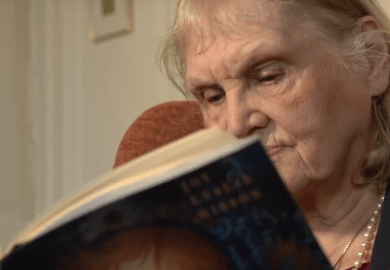Rejection is a word and an experience I’ve become well acquainted with since starting my PhD. Around every corner is another rejection; it’s just a fact of academic life.
A career in academia means dedicating time to publishing your research in academic journals. When I started my course, I was told that I needed to “publish or perish”, as this would help secure a future job.
And while we all want, and indeed need, to get our research out there, it’s not an easy process. For me the publishing process is complicated further by dyslexia, a learning difficulty that typically affects accurate and fluent word reading and spelling.
Everyone’s experience of dyslexia is unique, and many strengths can come with it, but dyslexic students in higher education often experience problems with writing to a high academic standard and will develop compensatory strategies to do it.
Being dyslexic in higher education also makes you question your ability to succeed. We have spent years struggling in education and still living in a society where dyslexia is misunderstood as laziness or a lack of intelligence.
I would never use my dyslexia as an excuse for having one of my papers rejected by an academic journal. And I wholeheartedly believe that the peer review process is a necessary and important step in academic publishing, but there are adjustments that could be made for those with specific learning difficulties trying to get their work published, especially for the first time.
The procedure of conducting and writing research papers is difficult enough, even for someone without dyslexia but, for me, the real problems begin when I submit to an academic journal.
The process of simply uploading a paper and filling in the forms associated with submission is not dyslexia-friendly at all.
For example, you’re asked to repeat information you have already filled in six times before.
And you’re faced with a barrage of badly worded questions including: “Have you or have you not possibly received funding at some point in the present or past?” or “Does this research have, or has had, a data set associated with it in the past or present or future?”
I’m embellishing slightly here, but for someone with dyslexia, this whole process is far more complicated than it needs to be.
Once the hurdle of uploading your manuscript is overcome, you wait anxiously for weeks, perhaps months, until you finally receive the email stating “Your manuscript is not yet suitable for publication. The reviewers have recommended the following amendments.”
I appreciate that rejection is an opportunity to improve my work. But the problem lies with how reviewer feedback is often phrased. In the academic world, many of us will have had a run-in with “Reviewer 2” whose comments are often densely written, contradictory and, at times, pretentious.
I often have to meet with my supervisor to go through the comments to understand what the reviewer meant before I can attempt to address them.
A colleague of mine recently received feedback that was written partially in Italian. In this case, the editor did interject and explain what the reviewer meant, but comments like these add to an already complicated process even for my non-dyslexic peers.
Academic publishing should be accessible to all researchers. We don’t want PhD and early career researchers to be deterred by the peer review process. However, universities, publishers, and editorial boards can play a role here in ensuring that not only those with specific learning difficulties, but all researchers, are met with respectful, constructive criticism and clear comments.
The solutions are simple. Journals could easily give authors a space during the submission process to indicate that they have a special educational need and any adjustments that they may require in the feedback. In my case, I’d ask that reviewers attempt to explain their points in layman’s terms, as clearly and concisely as possible.
When academia lives by the “publish or perish” mantra, publishing and the peer review process need to take into account the needs of all authors. Only by levelling the playing field in this way can every academic have a shot at success.
The author has asked to remain anonymous.
Register to continue
Why register?
- Registration is free and only takes a moment
- Once registered, you can read 3 articles a month
- Sign up for our newsletter
Subscribe
Or subscribe for unlimited access to:
- Unlimited access to news, views, insights & reviews
- Digital editions
- Digital access to THE’s university and college rankings analysis
Already registered or a current subscriber?




